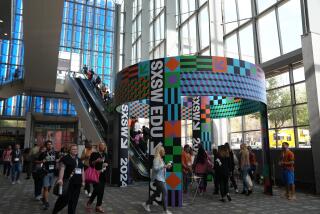Desert X show in Saudi Arabia brings more fallout: A donor pulls out
Desert X’s decision to partner with Saudi Arabia on its next exhibition has more fallout: The MaddocksBrown Foundation, an L.A.-based philanthropy organization that was one of Desert X’s early donors, announced that it was withdrawing funding.
The foundation said it had given Desert X about $13,000 in donations since 2017, and board Chairwoman Linda Brown released a statement that said the group was “disappointed that Desert X has chosen this path.”
Desert X, which presented large-scale, site-specific works across the Coachella Valley in 2017 and 2019, announced last week that its next iteration would be in Saudi Arabia’s AlUla region. The exhibition, featuring artists from the Middle East, Europe and the U.S., is funded by the Saudi government’s Royal Commission for AlUla and is set to open in January. It’s co-curated by Desert X artistic director Neville Wakefield and two Saudi women, Raneem Farsi and Aya Alireza.
Three Desert X board members — artist Ed Ruscha, art historian and curator Yael Lipschutz and philanthropist and former fashion stylist Tristan Milanovich — resigned to protest the partnership with a government responsible for human-rights abuses and the killing of journalist Jamal Khashoggi.
“It’s like inviting Hitler to a tea party in 1943 — I see a simile here,” Ruscha told The Times. “I see Saudi Arabia as being in desperate need of cultural legitimacy, and this is a way to move the spotlight away from their other problems.”
Desert X founder and board President Susan Davis said she was surprised by the MaddocksBrown news and had not heard it from the organization directly.
The acclaimed Coachella Valley art event Desert X opens in Saudi Arabia in 2020, sponsored by the government that assassinated journalist Jamal Khashoggi.
“Our decision to collaborate on the presentation of Desert X AlUla is rooted in our belief that it is better to engage than to isolate,” she said, “and that we have an opportunity to connect with the people of Saudi Arabia through the arts and, in turn, connect them with the rest of the world.”
Lipschutz told The Times she thought staging Desert X AlUla was “completely unethical.” But Jasmine Bager, a New York journalist who was born and raised in Saudi Arabia, took offense at criticism of the partnership.
“Non-Saudis need to realize that by boycotting these types of collaborations, the world is depriving regular Saudi citizens,” Bager said. “If you block us from valuable cultural exchanges like this, you are, in fact, contributing to a wider divide which you claim to want to halt.”
The controversy has made discussion of Desert X finances to become more public. Artist Kade L. Twist, half of the L.A.-based collective Postcommodity, which exhibited with Desert X in 2019, called the Saudi partnership opportunistic and said he would never work with the organization again.
“They owed us money for the project budget and the artist fee and that ended up being $22,000,” Twist said. “They made the final payment in July, but only after we made a threat and demonstrated that we had the support of a lawyer.”
A Desert X spokesperson said “all fees and reimbursements were paid to Postcommodity before July, and no lawyers were involved.”
For the 2016-2017 fiscal year, Desert X received $783,581 in nongrant contributions, according to tax filings. But for the fiscal year 2017-2018, the most recent year for which a tax filing is available, contributions to Desert X totaled $327,357.
Davis said the drop was misleading. The organization fundraises on a two-year cycle, she said, with a spike in donations the year of the exhibition. Davis said fundraising for 2018-2019 was on the rise, although she did not provide details.
“We’re not a museum, we’re not a huge institution with regularized revenue streams,” she said. “But our revenue from donations is growing.”
An unusual Getty tour looks at painting and sculpture through the lens of female empowerment.
Davis would not say how much the Royal Commission for AlUla was paying the organization, and she said she didn’t know how much individual artists were paid for their works. She personally received no money, she said, and considers herself a volunteer.
Perhaps more important, the money Desert X receives from the Saudi government for the AlUla exhibition will be used for “more robust” exhibitions and educational programming in the Coachella Valley, Davis said.
That, however, raises the question of whether Saudi money will taint future U.S. exhibitions. Will artists want to participate in the 2021 Desert X in the Coachella Valley if the funding comes with the same moral considerations at play in AlUla?
Davis didn’t think the reputation of Desert X was in jeopardy, and she said the AlUla project will help her organization moving forward. “I have reason to believe that we will get additional funding as a result,” she said.
No other donors have withdrawn funding, she said, although some have written to request further explanation about the Saudi partnership.
Palm Desert-based artist Phillip K. Smith III participated in the inaugural Desert X but is not involved in the AlUla iteration.
“Art has the ability to go into conflicted territories and open up discussion,” he said. “And in the end, it’s about the timing of when that happens, and how it happens, and how the message is relayed from the get-go.”
Ultimately, he added, “my focus and my interest are in this place, our desert, in what Desert X has already done.”
More to Read
The biggest entertainment stories
Get our big stories about Hollywood, film, television, music, arts, culture and more right in your inbox as soon as they publish.
You may occasionally receive promotional content from the Los Angeles Times.







